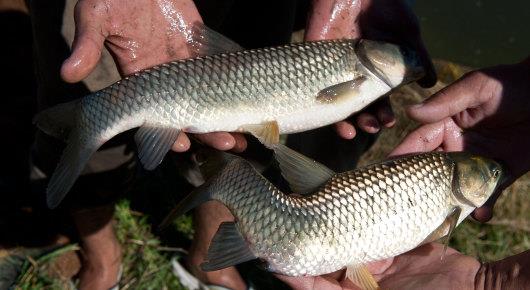Ukraine learning to assess food losses and waste in fisheries sector

A global drive to reduce food losses and waste all along the value chain has arrived in Ukraine, where this week the fisheries and aquaculture sector tackles the issue.
Experts from FAO’s Fisheries Division in Rome, Italy are conducting a training course in Kyiv for representatives of Ukraine’s Ministry of Ecology and Natural Resources, State Ecological Academy, National University of Life and Environmental Sciences, and Kyiv National University of Trade and Economics.
Participants will learn new methodologies for assessing food losses and waste in fisheries and aquaculture. The aim is to build capacity among the country’s national experts as a foundation for further work on losses and waste by the Fisheries Agency of Ukraine.
“Post-harvest fish losses are a major concern and occur in most fish distribution chains throughout the world,” said Esther Garrido Gamarro, FAO fisheries technical expert. “In order to avoid losses, the causes and types of loss must be well understood. It is key that all participants understand the root causes of losses before they go into the methodology to assess. Only in this way will we be able to provide effective and sustainable loss reduction interventions.”
In recent years, the topic of food losses and waste has been gaining importance in both the public and private sectors of global food systems. Many initiatives are being undertaken worldwide, because of the impact on food security and on local and national economies.
Reducing food losses and waste is a major strategic focus for FAO. The promotion of sustainable fisheries is expressed in such instruments as the FAO Code of Conduct for Responsible Fisheries and the Voluntary Guidelines for Securing Sustainable Small-Scale Fisheries.
An FAO study on Ukraine’s fisheries and aquaculture sector conducted in 2016-17 – complemented by an extensive consultation process – pointed to the need to train a cohort of Ukrainian experts who would in train others. The aim is to transfer technical knowledge about fisheries sector losses and waste to other national experts, officials, and students.
“Our company as a socially responsible business and an active participant in the SAVE FOOD initiative systematically contributes to minimizing waste in the food industry,” said Irina Mirochnik, president of the IMMER Group. “The use of innovative technologies for the production of flexible packaging can significantly extend the shelf life of products and conserve their nutritional value. It is important to note that with correct packaging it is possible to prevent up to 50 percent of losses due to food spoilage.”
3 August, 2017, Kyiv, Ukraine
